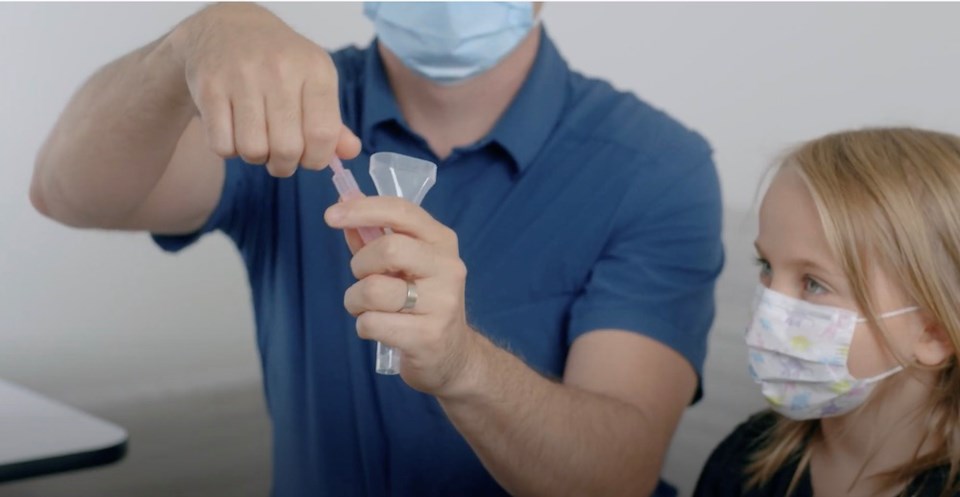With students back in classrooms and the province continuing to see increasing numbers of new COVID-19 cases, many children may find themselves heading to COVID-19 test centres across B.C. in the coming months.
If they do, school-aged children now have the option to take a slightly less-invasive COVID-19 test.
According to the B.C. Centre for Disease Control (BCCDC), saline, or saltwater, mouth rinse and gargle has been approved as a more comfortable alternative to nasopharyngeal swab collection for outpatient youth in Grades K – 12 getting tested for the virus, who are able to follow instructions on how to swish, gargle and spit a small amount of saline into a funnel. Either test can accurately determine whether a child has COVID-19.
B.C. provincial health officer Dr. Bonnir Henry announced the B.C.-made solution during a press briefing Thursday, adding that the new testing method reduces the province's reliance on the global market and global supply chains.
“On a positive note, we have some exciting new testing that we are able to provide for students in British Columbia,” said Henry. “Today a new made-in-B.C. sample collection program has been launched for all k-12 students across the province and it is one of the first of its kind around the world.”
Henry thanked both scientists and businesses for their work in developing this new means of testing and making it accessible to students in British Columbia.
B.C.'s pediatric testing guidelines for British Columbia were updated on Thursday, Sept. 17 with information about the saline gargle sample collection for children.
According to the BCCDC, "most school-aged children from kindergarten through to grade 12 who go to a COVID-19 collection centre can do the mouth rinse and gargle sample," rather than the nasopharyngeal swab that's been used for the vast majority of testing in North America since the COVID-19 pandemic began.
The nose swab will still be used for younger children or those who may not be able to follow the swish, gargle and spit instructions, explains the BCCDC on its website. Health officials note that most children aged 5 years or older are able to provide a saline sample, with a little guidance.
While the nasopharyngeal swab isn't painful, the sensation—which many healthcare providers compare to the feeling of getting water up your nose while swimming or snorting a fizzy drink—isn't necessarily pleasant.
Parents and caregivers are encouraged to assess their child daily for key COVID-19 symptoms before sending them to school. If a child is experiencing one symptom from the following list that persists for more than 24 hours, a fever, or two or more symptoms from the list, they should be assessed to determine if they should seek testing for COVID-19. Parents can use the COVID-19 assessment tool to determine if their child should seek testing.
According to the BCCDC, the symptoms most commonly associated with COVID-19 infection include:
- Fever (see below)
- Chills
- Cough or exacerbation of chronic cough
- Shortness of breath
- Sore throat
- Runny nose
- Loss of sense of smell or taste
- Headache
- Fatigue
- Diarrhea
- Loss of appetite
- Nausea and vomiting
- Muscle aches
Testing is available for anyone with cold, influenza or COVID-19-like symptoms, and is not recommended for asymptomatic youth.
Children should not eat, drink (even water), chew gum, brush their teeth, smoke or vape for at least one hour before the mouth rinse and gargle test. According to the BCCDC, they should also avoid practising the swish, gargle and spit method two hours or sooner before the test. "This might affect the amount of virus that is in their mouth, which can affect the results of the test," the Centre explained.
Check out this video, posted by B.C.'s Provincial Health Services Authority to YouTube on Tuesday, showing what children should expect when getting tested for COVID-19:
Most children are not at high risk for COVID-19 infection, while the virus has a very low infection rate in children under the age of 19. Until the end of August 2020, fewer than five children in B.C. were admitted to hospital for COVID-19. None required intensive care and there have been no deaths.
The majority of children who have been infected with COVID-19 have experienced mild illness. According to the BCCDC, children are known to have similar symptoms to adults, "but are less likely to have fever, shortness of breath or cough. Signs and symptoms of COVID-19 in children may be similar to those of other childhood illnesses."
- With files from Albert Van Santvoort



